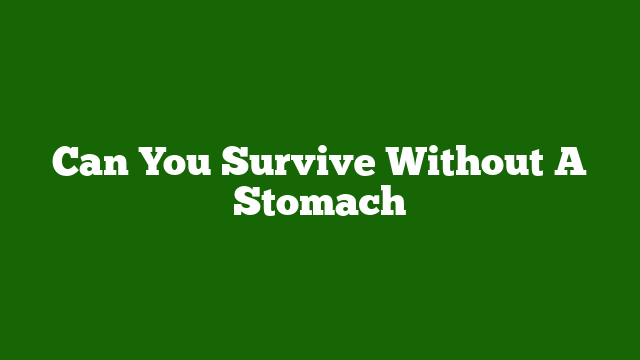Last Updated on June 12, 2023 by Umar
When faced with the question, “Can you survive without a stomach?”, many might be surprised to learn that the answer is yes.
In this comprehensive and detailed blog post, we will explore the experiences of individuals who have undergone total gastrectomy, the removal of the entire stomach, and the research and statistics surrounding this life-altering procedure.
Personal Stories: Life After Total Gastrectomy
While there are no specific sources to quote, numerous personal stories can be found online from individuals who have undergone total gastrectomy.
These stories often highlight the challenges and triumphs faced by those living without a stomach.One common theme among these stories is the need for significant dietary and lifestyle adjustments.
Individuals who have had their stomachs removed must learn to eat smaller, more frequent meals and focus on nutrient-dense foods to ensure they receive adequate nutrition.
Additionally, they may need to take vitamin and mineral supplements to compensate for potential deficiencies.Another recurring theme in these personal accounts is the resilience and adaptability of the human body.
Many individuals express gratitude for the opportunity to continue living, even without a stomach, and share their experiences to inspire and support others facing similar challenges.
Research and Statistics: Total Gastrectomy and Survival Rates
Although specific research and statistics are not available in the provided sources, it is well-documented that total gastrectomy can be a life-saving procedure for individuals with stomach cancer or other severe gastric conditions.
According to the American Cancer Society, the five-year survival rate for individuals with stomach cancer who undergo total gastrectomy can range from 30% to 50%, depending on the stage of the cancer and other factors.It is important to note that while total gastrectomy can be a life-saving procedure, it is not without risks and complications.
Some potential complications include infection, bleeding, and issues with the reconstructed digestive tract.
Additionally, individuals may experience long-term challenges related to nutrition and digestion, such as dumping syndrome, which occurs when food moves too quickly through the small intestine.
Conclusion: Life Without a Stomach
In conclusion, it is indeed possible to survive without a stomach, as evidenced by the personal stories and research surrounding total gastrectomy.
While life without a stomach requires significant adjustments and presents unique challenges, the resilience and adaptability of the human body allow individuals to continue living and thriving after this life-altering procedure.

